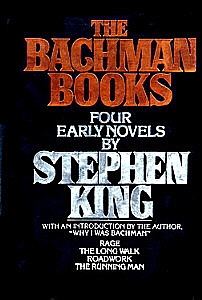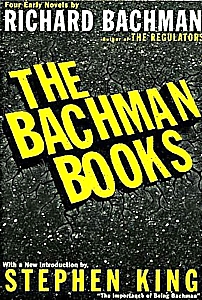

| The Bachman Books |
|---|
 |
| Publication Information
|
 |
With the exception of The Long Walk (whose small cult status warranted multiple printings), Richard Bachmanís novels were published and then quickly went out of print. As a novelist, Richard Bachman hadnít proven very popular. As a pseudonym, however, Bachman was extremely popular. Released in the wake of the publication of Thinner and the revelation that Richard Bachman was Stephen King, The Bachman Books anthologizes the first four novels King released under his pseudonym. Arriving in trade paperback and hardcover almost simultaneously, this omnibus edition allowed Kingís regular readership to avoid the now-exorbitant prices of the paperback originals, and to own and read these early novels for the first time.
This initial release of The Bachman Books also offered some explanations. The essay, "Why I Was Bachman" goes a little way toward explaining why King felt it necessary to publish under a pen name. Bothered by the fact that his success might have been a fluke, King wanted to see if it was the work, not the name, that was pushing the books. The fact that both Thinner and The Bachman Books arrived on the bestseller lists only after the truth of its authorship had been revealed is telling.
King goes on to indicate his larger plans for Bachman, who was never meant to be a short-term solution. Believing Thinnerís minor success was a portent of mass success, King had hoped that the next Bachman novel, Misery, would finally propel his pen name to bestseller status. It is interesting to wonder what might have happened if Bachmanís true identity had remained a secret. As a King novel, Misery went to #1 on both the hardcover and paperback charts; might this have happened under Bachmanís name? What later King novels might have been released as Bachman books? Dolores Claiborne, whose tone and length seem particularly suited to the Bachman style, seems likely. The Girl Who Loved Tom Gordon? The Colorado Kid, perhaps? On the converse, The Dark Half - which had sprung from Kingís struggle to make sense of Bachmanís existence - may never have been written; ditto The Regulators, if not Desperation.
If "Why I Was Bachman" is short on real analysis (and interestingly long on glibness), itís with good reason: despite his stated relief, King didnít want Bachman to go away, and he was still hurting from it.
When The Bachman Books was released in a new omnibus edition preceding the release of The Regulators, King had had more time to ruminate on Bachmanís strange life and death. In his new essay, "The Importance of Being Bachman," he explains that, when the idea for The Regulators came to him, the concept that Bachman - or at least Bachmanís output - didnít have to be dead came along with it. While Thinner might have been Bachmanís last novel, that didnít mean that Bachman hadnít left any books behind when he died. Thus, The Regulators, as well as the later publication of Blaze, could be explained as "posthumous" novels.
King also takes the time to explicate more fully why he initially chose to be Bachman, and why heís chosen to revisit his pseudonym now. Under his name, King could express ideas and explore concepts he felt he couldnít when writing as Stephen King. With Bachman, the expectation of what he could and should write was not as important as with King. Bachman, too, could write horror (Thinner and The Regulators could both be classified as such), but he could also write mainstream novels like Rage and Blaze, as well as science fiction, as with The Running Man and, in part, The Long Walk. In important ways, King explains, Bachman became real to him, not an alter ego so much as an alter id. Both essays - even the more obfuscating "Why I Was Bachman" - are remarkably inward-looking. Not until the publication of On Writing would King scrutinize himself and his career so nakedly.
The metafiction concept of Bachman as a fake writer constructing real novels may not appeal to regular readers, and some might not understand the connection at all. This goes a long way toward explaining way in which Blaze was published - as Richard Bachman, but featuring Stephen Kingís name prominently on the cover. (The paperback went a step further, indicating that it was by "Stephen King writing as Richard Bachman.") When King chose to pull Rage from publication, The Bachman Books as a collection went out of print; The Long Walk, Roadwork, and The Running Man are all once again individual novels, albeit published under Kingís name. Whether this signals a failure in the ongoing construct of Bachman as a real person is vague, as is the question of whether any more "lost" Bachman novels are forthcoming. But the fact that Bachman could exist at all, as well as survive his "death" to publish a series of New York Times bestsellers, is a testament to both Kingís creativity and his continued mass appeal.